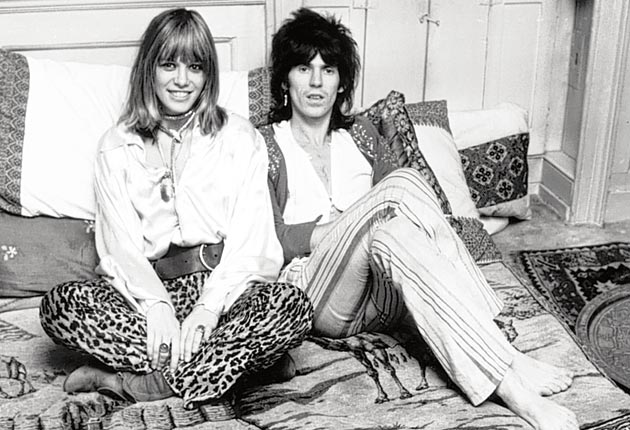David Lister: So there was a price to pay for free love after all – right, Keith?
The Week in Arts

Much fun has been had with Keith Richards's slights on his Rolling Stones bandmate Mick Jagger, in particular his revelation that Jagger's manhood is rather smaller than rock'n'roll myth would have it. The Richards/Jagger tension will be a feature of the guitarist's soon-to-be published memoir, and he has talked about it in an interview about the book.
Jagger has not responded, but the former Mrs Jagger, perhaps feeling wounded by proxy at comments about Mick's manhood, took up the cudgels on his behalf. Jerry Hall told the world that Keith had always been jealous of Mick. It's easy to forget with all the sniping going on that we are talking about two soon-to-be septuagenarians here, not a couple of teenagers having a tiff. Perhaps the secret of eternal youth that rock legends try to capture lies in keeping the adolescent sniping going right into their dotage.
But behind the tale of the fraught yet enduring friendship between Jagger and Richards is a greater truth that Richards has unwittingly laid bare.
He hints that the friendship suffered its harshest blow when he suspected in 1969 that Jagger was having an affair with his Sixties partner Anita Pallenberg. Richards then had a liaison with Jagger's girlfriend, Marianne Faithfull, out of revenge. In his forthcoming book, Richards paints Pallenberg, with whom he had three children, as a key love of his life. Writing about her alleged affair with Jagger, he relates, almost poignantly, how he waited for Pallenberg to come home one night fearing she had gone off with his best friend. He sat all night listening for the sound of her car, but it and she did not come back.
Wait a minute, though. Wasn't this the era of free love, sexual liberation, anything goes and we're all friends afterwards? This was the Sixties, when communes (that long-forgotten word) were in vogue, and when shared partners were a middle-class aspiration – in theory, at least. It was the rock stars of the day who were at the pinnacle of this lifestyle, and who gave out the message as often as they could that it was a life not just full of thrills, but part of a much-needed political revolution to break the patriarchy and downright boredom of conventional relationships and the nuclear family.
Well, now it appears that this was a bit of a fib. Even for the biggest rock'n'roll rebel of them all, it was a case of desperately waiting for the sound of his partner's car, followed by bitter hurt, pain and that emotion which was meant to have been formally abolished somewhere around 1967 – sexual jealousy. That jealousy was followed in Richards's case by sexual revenge and a friendship that never completely recovered.
Keith Richards may have written a more important social history than he intended.
Why are the Mobos still running?
On the subject of the Rolling Stones, they should, of course, have won an award this week. The Mobos, which took place on Wednesday, are for music of black origin, and there is no disputing that Keith Richards and the rest of the band were hugely influenced by the black blues musicians in America. Come to that, many white bands and solo artists are influenced by black music. You could even argue that all of them are, as the architects of rock'n'roll, Chuck Berry, Little Richard and the like were black. You could also argue that these awards are utterly nonsensical for that very reason.
I would argue exactly that. I would add that the Mobos are patronising and not a little divisive in making colour an issue in music, what I hope is the most colour-blind of art forms. All in all, isn't it time to scrap these unnecessary awards?
End of an era for arts funding
When George Osborne in his spending review speech said that arts organisations should be cut by 15 per cent, it seemed to most of the country a fairly incongruous remark. Indeed, as many organisations were expecting a 30 per cent cut, it almost seemed like good news. So why is the arts establishment muttering furiously about the Chancellor?
It is because, for better or worse, England operates an arm's-length principle in which the Arts Council decides what arts organisations get, and the Government never but never interferes. The Government can say what the global sum to the Arts Council is, but it cannot say what arts venues and companies should be awarded from that sum. Mr Osborne is cutting the Arts Council's overall grant by 30 per cent but telling it to pass on only 15 per cent cuts to frontline arts organisations. So he is deciding how much arts companies will get.
Was it a slip of the tongue by Mr Osborne? Or did he on Wednesday simply rip up an agreement that has been in place since the 1940s? It's a space worth watching.

Join our commenting forum
Join thought-provoking conversations, follow other Independent readers and see their replies